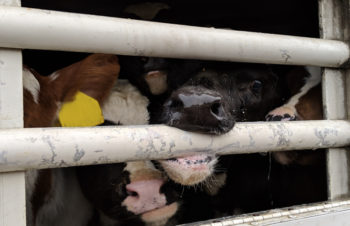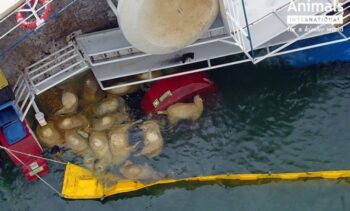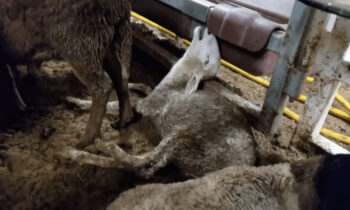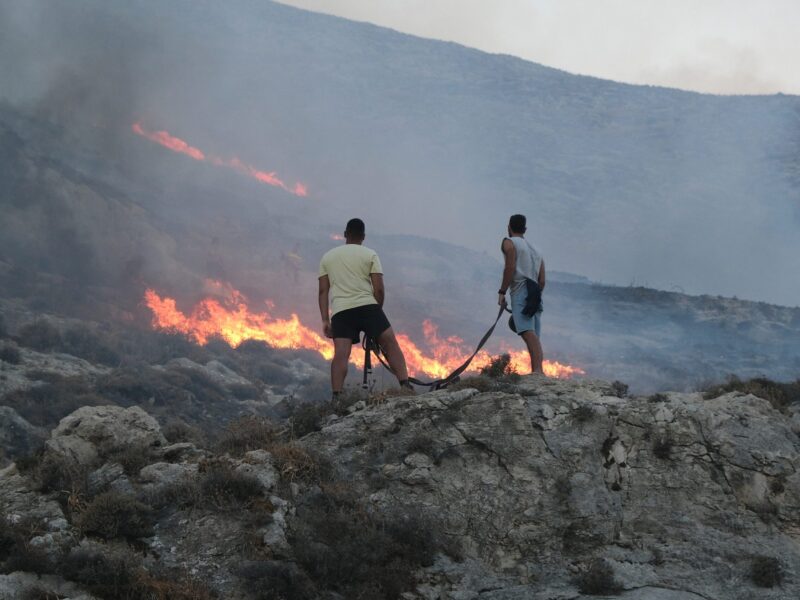
Ending the Evil that is Live Export

UK calves in transit for export | Credit: Compassion in World Farming
Today (14th June) campaigners all over the world will unite for the sixth annual International Awareness Day to Ban Live Exports, spearheaded by Compassion in Word Farming.
Way back in in 1967, concerned at the growing disconnect between modern agriculture and the well-being of animals and the environment, Peter Roberts and his wife Anna founded Compassion in World Farming.
And in December 1972, Compassion first presented a petition to the Minister of Agriculture with over half a million signatures calling for a live export ban.

The tragic, overloaded Queen Hind that capsized with all 14,000 sheep on board, only 180 sheep survived | Credit: Animals International
Fast forward to the current time and the world has witnessed numerous cruel and horrific live export disasters. Many will recall the Queen Hind with 14,600 sheep on board, which on 24th November 2019 capsized and sank in Midia Port, Romania leading to the deaths of thousands of sheep. After the disaster, rescuers managed to save 254 sheep, although dozens later died of exhaustion and injuries. The animal welfare groups that led the rescue refused to send the surviving 180 sheep to their deaths and the remaining sheep now live in a sanctuary in Romania. At the time it was unknown why the ship capsized, however, it was subsequently discovered that the ship had secret decks and was overloaded.
Only last year the ships, Karim Allah and Elbeik, left Spain in December 2020 with a total of almost 2,600 Spanish male calves on board. Despite knowing the animals would not be accepted in Turkey due to the presence of blue tongue disease, Spain let them leave European waters, causing the animals on Karim Allah to suffer for two months at sea and the Elbeik for three months at sea. (Once live animals have been exported from the EU, they may no longer be re-imported into the EU). Conditions on board were described as ‘hellish‘, many died at sea and were thrown overboard and, amid reports that the vessel had not received any further stocks of animal feed, the weak and stressed animals remaining were destroyed when the ships docked back in Spain. A completely unnecessary and tragic situation that yet again involved nothing but suffering and pain for the animals.
And then most recently, around 20 ships carrying 200,000 animals from Romania, Spain and South America, were stuck in the Suez Canal behind the gigantic, stricken Ever Given cargo ship which ran aground. These livestock ships departing the European countries were most likely carrying sheep. We know little of the detail but what is known, is that the ships run out of food and water before they reached their final destination. The animals’ ultimate fate delayed by stress and appalling suffering.

A lamb lies in the bog, a mass of faecal matter and urine, that has built up in the pens of the live export ship Awassi Express on a voyage from Fremantle to the Middle East in August 2017 | Credit: Supplied by 60 Minutes/Channel Nine.
There is little doubt that the current global live animal export trade which sees millions of animals transported by air, sea or land, is both unethical and cruel, and chilling in its blatant disregard for the welfare of the sentient animals that are transported.
However, there is reason for hope on the horizon.
After decades of campaigning, on 14th April 2021 New Zealand announced in a world first, that it would stop transporting livestock by sea in a phased two-year period. New Zealand’s own ban came after their live exports disaster in September 2020, when a livestock carrier capsized off the coast of Napier, resulting in the deaths of 41 crew members and nearly 6,000 cattle.
In the United Kingdom in May, we saw historic progress for animal welfare with plans for key reforms announced by government, including legal recognition of animal sentience and a ban on live exports. These, and a suite of other measures, were outlined first in the Queen’s Speech and then in a Defra’s Action Plan for Animal Welfare. In total, 40 measures were unveiled covering farmed, wild and companion animals, which together add up to the biggest welfare shake-up in a generation. And only on Tuesday last week, the UK government published its new Animal Welfare (Kept Animals) Bill, ushering in the final stage of an end to the cruel trade in live exports. The Bill will legislate to end all exports from Great Britain of cattle (including calves), sheep and pigs for fattening and slaughter.
Due to COVID-19 restrictions, we can’t take to the streets today, but that doesn’t stop us from providing a voice for the millions of animals forced to endure long journeys for slaughter and fattening every year.
Please join us in calling on the EU Commission to follow the examples set by New Zealand and, more recently, the UK, and implement a ban on the export of live animals for fattening and slaughter https://action.ciwf.org.uk/page/83717/petition/1 . And please take to Twitter to get #BanLiveExports trending!
Enough is enough. It’s time to ban the evil that is live animal exports!
How you can get involved:-
Please help Compassion in World Farming and use this link to sign our petition to join the call for a future without factory farming
On Monday 14th June, support Ban Live Export International Awareness Day
– Mark yourself as attending or interested on the Facebook Event page to keep updated and get involved in an action on the day.
– Take part in the global action on Twitter on the 14th of June, using #BanLiveExports
For more information on Ban Live Exports: International Awareness Day, visit: www.stoplivetransport.org





